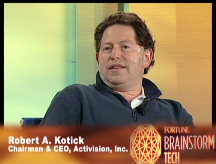Napster 2.0's sad song
The online music service's CEO faces a host of challenges - including a pesky ice cream store owner's proxy campaign.
(Fortune) -- Poor Chris Gorog. He's the guy who predicted he could make a hit out of a legal version of Napster, the renegade Internet music file-sharing service that attracted 26 million monthly users until it was driven into bankruptcy by record industry lawsuits.
That was back in 2002 when Gorog was CEO of Roxio, a CD-burning software firm. He'd just struck a deal to acquire the insolvent Napster's assets - including its name and iconic kitty logo - for $5 million. Gorog renamed his company Napster and launched a paid music subscription service, insisting the brand alone would draw millions of customers.
Well, that didn't happen. Today, Napster, headquartered in Los Angeles, has only 760,000 subscribers who pay about $13 a month to listen to its library of 6 million songs. The company has never been profitable. Napster lost $16 million in its most recent fiscal year ending in March on what it described in a press release as "record revenues" of $127.5 million. Wall Street has pretty much given up. Napster's stock price has fallen 69% to $1.44 in the 3 1/2 years since its re-launch.
Now the situation is about to get more absurd. The 55-year-old Gorog, who declined comment, is trying to fend off a proxy campaign bankrolled by Kavan Singh, a 26-year-old entrepreneur who owns, among other enterprises, a chain of Cold Stone Creamery ice cream stores.
Singh and two other disgruntled investors, all enthusiastic Napster subscribers, are vying for board seats at the company's Sept. 18 annual meeting.
At least, Shawn Fanning, the teenage founder of the original Napster, did battle with fat-cat record company executives who made him look like a folk hero. Gorog is reduced to fighting with his customers. Talk about bad PR.
What went wrong? Almost everything, it seems. First of all, the gross margins in the legal digital music business are slim. A company like Napster only keeps about 30% of its subscription sales. It makes a paltry 10% on individual download sales.
Secondly, Napster 2.0 faces stiff competition. Apple (AAPL, Fortune 500) launched its iTunes store shortly before the new Napster's debut and immediately dominated the download market. That, of course, is because Apple makes the ubiquitous iPod. It also wrapped iTunes songs in its proprietary copy protection software that rendered them unplayable on any other music player. Napster was stuck selling downloads to people who owned players made by companies like SanDisk (SNDK). How many of them do you know?
Gorog thought Napster could carve its own profitable niche by offering monthly subscriptions. But those services haven't taken off. Yahoo (YHOO, Fortune 500) and AOL (TWX, Fortune 500) once had similar offering but they've abandoned the music subscription business.
Even so, Napster continues to face tough competition from RealNetwork's (RNWK) Rhapsody. Today, Rhapsody boasts 1.9 million subscribers, including users of its steaming radio service.
"The [subscription] audience is limited," says Russ Crupnick, senior entertainment industry analyst at market research firm NPD. "Rhapsody got there first."
Napster has tried diversify its revenues by cutting a deal with AT&T (T, Fortune 500) to let subscribers download songs to their cell phones. In May, it began selling individual downloads that can be played on an iPod because they aren't copy protected. But none of this has lifted Napster's shares.
"This is a company that has tried strategy after strategy and has no meaningful traction," says Steven Frankel, an analyst at Canaccord Adams, who has a "sell" recommendation on Napster's stock.
Gorog is now being challenged by three investors who love Napster. They can't believe the company is doing so badly and think it must be as result of Napster's marketing efforts.
"When you tell people they should get Napster, they say, 'What are you trying to do? Get me arrested?' " fumes Thomas Sailors, 49, manager of personal investment holding company Cloverdale Investments, who is running for a board seat with Singh. "That tells me management is doing a poor job of communicating what this company does."
It's hard to predict whether Singh and his running mates will prevail. Together, they control little more than 1% of Napster's shares. But they will get attention. Even though Napster doesn't have a lot of customers, it gets an inordinate amount of press for a company of its size due to its colorful past. Gorog can thank Shawn Fanning for that.
Here's another reason why Napster could be in the news: It has a market cap of $67 million. But as of May, Napster had $69.8 million in cash. That's caused some of the company's largest shareholders to increase their holdings in hopes the company will be acquired.
"We think [Napster] could be an attractive target," says Mark Lebovitz, a portfolio manager at Munder Capital Management, which owned 6% of the company's shares as of the end of March. And, he adds, "Napster still has a solid brand name."
Yes, but isn't that what Gorog was betting on? The most obvious potential buyer is RealNetworks, which declined to comment. But perhaps RealNetwork's CEO Rob Glaser should wait until Napster's shares fall a little more. Haven't we all learned what happens when you invest too much in a famous name? ![]()
-
 The retail giant tops the Fortune 500 for the second year in a row. Who else made the list? More
The retail giant tops the Fortune 500 for the second year in a row. Who else made the list? More -
 This group of companies is all about social networking to connect with their customers. More
This group of companies is all about social networking to connect with their customers. More -
 The fight over the cholesterol medication is keeping a generic version from hitting the market. More
The fight over the cholesterol medication is keeping a generic version from hitting the market. More -
 Bin Laden may be dead, but the terrorist group he led doesn't need his money. More
Bin Laden may be dead, but the terrorist group he led doesn't need his money. More -
 U.S. real estate might be a mess, but in other parts of the world, home prices are jumping. More
U.S. real estate might be a mess, but in other parts of the world, home prices are jumping. More -
 Libya's output is a fraction of global production, but it's crucial to the nation's economy. More
Libya's output is a fraction of global production, but it's crucial to the nation's economy. More -
 Once rates start to rise, things could get ugly fast for our neighbors to the north. More
Once rates start to rise, things could get ugly fast for our neighbors to the north. More









